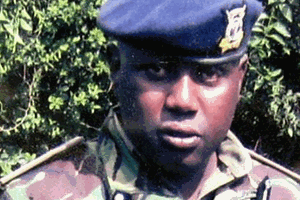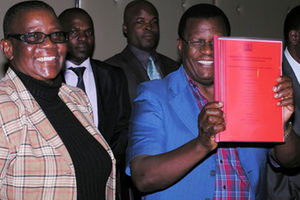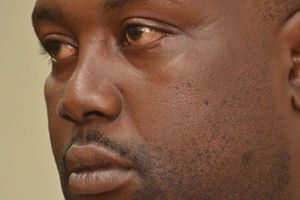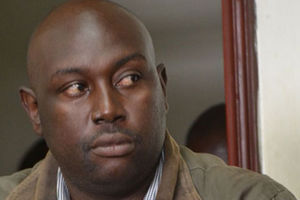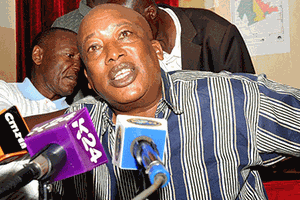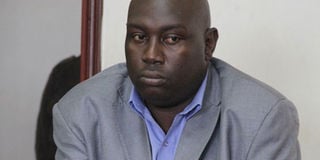
Joshua Waiganjo at a Nyeri court on October 4, 2013.
For 11 years, Joshua Karianjahi Waiganjo navigated a delicate legal web, facing serious charges ranging from robbery with violence to impersonating senior police officers in courts in Nakuru and Naivasha.
Enduring imprisonment and public ridicule, Mr Waiganjo, who spent years in Naivasha Maximum Prison, challenged each charge and eventually secured an acquittal under Section 210 of the Criminal Procedure Code, clearing him of all charges.
Now, freed from the shadow of his past, Mr Waiganjo told the Nation - in an exclusive interview - that he is seeking retribution against those he believes orchestrated his ordeal by launching a legal quest for justice and compensation totalling Sh1.5 billion.
Led by his legal team, including lawyers Danstan Omari and Gordon Ogolla, Mr Waiganjo is seeking redress for the emotional, social and financial damage he suffered during his 11-year ordeal, signalling a new chapter in his quest for vindication.
For a man who has walked with the title of police imposter, the road to exoneration has been arduous, marked by a series of legal battles and personal hardships.
From the outset, he faced various charges implicating him in several ugly incidents that drew public condemnation, including the killing of 40 police officers by bandits in Samburu County, famously known as the 'Baragoi Massacre'.
Additional charges of robbery with violence, harassment of businessmen and the theft of a lorry further tarnished his reputation and exposed him to public condemnation and ostracism.
Despite the weight of these accusations, Mr Waiganjo was determined to clear his name, fighting each charge head-on, challenging convictions and navigating the complexities of the legal system.
And through years of imprisonment and court hearings, he maintained his innocence, unwavering in his belief in justice.
The turning point in Mr Waiganjo's ordeal came with a court ruling in Naivasha, where he was acquitted on Thursday under Section 210 of the Criminal Procedure Code.
The decision by Naivasha Chief Magistrate Nathan Lutta was the culmination of years of legal wrangling and gave Mr Waiganjo the long-awaited vindication he had been relentlessly seeking.
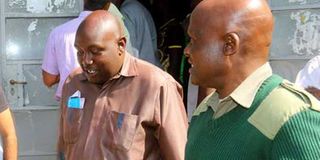
Mr Joshua Waiganjo (left) leaves court on September 22, 2015. He was then sentenced to five years in prison by a Naivasha court for impersonating an assistant police commissioner.
With the weight of false accusations lifted, he is now turning his sights on those he holds responsible for his suffering.
"This trial has taken me through 11 years of hell because somebody decided to make some malicious allegations against me. I want to make sure that the people responsible for my suffering pay for their actions. If you decide to take someone to court without any evidence and they are acquitted, you must be prepared to pay the price," Mr Waiganjo told the Nation in an interview.
Driven by a desire for justice, Mr Waiganjo has instructed his legal team to seek compensation totalling Sh1.5 billion, citing the immense toll taken by years of legal battles and public scrutiny.
The damages he is seeking cover the emotional, social and financial impact of his ordeal, underlining the profound effect the false accusations have had on his life.
"This case has affected me physically, socially and psychologically. I lost my friends and people close to me, including my father, whose death was triggered by this case. I was a husband and father who could not provide for my family," he said.
According to Mr Waiganjo, someone was behind his arrest and prosecution for reasons he does not know.
"I spent years in prison for a crime I never committed. They cut off my source of income when they sacked me, confiscated my truck and left my children to suffer. I was tried and convicted in the court of public opinion and everyone considered me a criminal," he said.
His legal team, led by Danstan Omari and Gordon Ogolla, say they are committed to seeking justice for Mr Waiganjo. They say they have compiled evidence and arguments to support their client's claims and will leave no stone unturned in their quest for retribution.
According to the lawyers, Mr Waiganjo, who was acquitted under Section 210 of the Criminal Procedure Code, can sue for compensation.
"We will sue the government and all the officers of the National Police Service who arrested, prosecuted and gave false evidence against Mr Waiganjo. The damages sought include loss of employment, damaged reputation, diminished self-esteem and public humiliation," said lawyer Omari.
Central to their case is the assertion that Mr Waiganjo's rights were egregiously violated, resulting in profound and lasting harm.
The case is also based on the loss of his livelihood due to the erosion of his reputation.
"The arrest and detention of my client in police cells and in Naivasha prison has affected him emotionally and psychologically. All his friends have abandoned him, leaving his family to suffer," he said.
The lawyer argued that he will seek Mr Waiganjo's reinstatement to his position as Assistant Commissioner of Police and demand all his salary arrears since the day of his arrest.
"Our argument is that our client was duly recruited into the National Police Service and his salary was unjustly terminated as a result of the malicious allegations. We believe that by now he would have been promoted to a higher rank. Who knows, maybe he would have become the Inspector General of Police," the lawyer said.

Joshua Waiganjo.
Mr Waiganjo was arraigned in a Naivasha court in 2013 and charged with various offences including impersonating a senior police officer, robbery by force and possession of police uniforms.
Also Read: Case against ‘fake’ officer derails again
Among the witnesses who testified against him are senior police officers, including Sergeant John Kariuki, then the head of the Naivasha Criminal Investigation Department based at the Anti-Stock Theft Unit in Naivasha, CIP Richard Kowyer, formerly the deputy DCIO in Naivasha, and police officers Joseph Korir and Peter Mwangi, among others.
Mr Waiganjo allegedly introduced himself to the officers as an Assistant Commissioner of Police and wore uniforms with rank insignia.
In 2015, he was convicted on five counts, including impersonating a public officer, wearing a police uniform and being in possession of government stores.
He was sentenced to five years for wearing a police uniform, one year for impersonation and three months for each of the other charges.
However, the court acquitted him of robbery with violence for lack of evidence.
He challenged his conviction in the High Court in Naivasha, which ordered a retrial in 2017, and in its ruling, the High Court found that the trial court had committed serious errors with serious flaws in the trial process.
The errors included the trial court's failure to invite Mr Waiganjo to plead to all charges in the amended charge sheet and to inform him of his right to recall all witnesses who had testified before the amendment.
The High Court also faulted the trial court for failing to consider the appointment letter tendered by Mr Waiganjo on July 20, 2015 as an exhibit during the defence case.
The letter, dated May 29, 2003 and seen by the Nation, was to serve as evidence confirming his appointment to the position of Kenya Police reservist.
The letter, addressed to Mr Waiganjo through Nakuru West OCPD, appointed him as an Assistant Commissioner of Police Reservists and was signed by the then Rift Valley Provincial Police Officer (PPO) Peter Kimanthi on behalf of the then Commissioner of Police Mathew Iteere.
"Due your exemplary and dedication to duty, I hereby appoint you ACP Police Reservists. You are to oversee the activities of all Police Reservists in the Northern Rift, particularly in Kapenguria in West Pokot, Kitale and Nakuru," the letter read.
The High Court judge had noted from the recorded list of exhibits that the letter was neither marked for identification nor produced, and noted that it was the duty of the trial judge to ensure that the list of exhibits and witnesses is accurately prepared during the trial.
According to Mr Waiganjo, no one has ever contested the letter.
The court placed the blame squarely on the trial court, which it said had failed to comply with the provisions of sections 207, 208 and 214 of the Criminal Procedure Code.
Dissatisfied with the High Court's order for a retrial, Mr Waiganjo approached the Court of Appeal to challenge the High Court's decision.
He argued that he had already served the sentence during the time he had been in detention since his arrest and that it would be unfair for the court to punish him twice.
Judges Paul Nyamweya, F. Ochieng and W. Korir of the Court of Appeal, in their judgment of February 16, 2024, found that the High Court's decision to order Mr Waiganjo's retrial was not proper in law.
The judges found that the prejudice caused to Mr Waiganjo by the trial court's failure to consider his letter of appointment, which formed a key part of his exhibit list, could not be remedied by a retrial.
According to the judges, the High Court's decision to allow the first appeal had the effect of quashing Mr Waiganjo's conviction and quashing the sentences.
"No cross-appeal has been filed against these orders of the learned judge and we grant the appellant's application and order that he be set at liberty forthwith," the judges ruled.
Following the ruling, Naivasha Chief Magistrate Nathan Lutta, while releasing Mr Waiganjo, said the court was bound by the Court of Appeal's decision.
"The Court of Appeal in its judgment ordered that the accused be released and this court is bound by the doctrine of stare decisis and the accused is acquitted in terms of section 210 of the CPC," the magistrate ruled.

